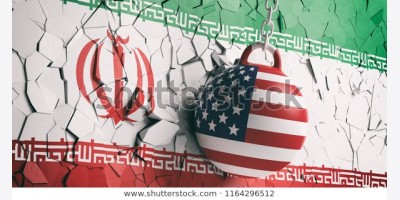Robert Berke
One month after the Iran nuclear deal was concluded, the Middle East is still reeling from profound shock. Long and well established alliances have led to bewildering changes, not only in the Mideast, but across the world.
The stark difference is nowhere more strikingly revealed than in the media reports on the recent Iran nuclear deal. In a recent article on the front page of the Tehran Times, the author compared President Lincoln’s battle with a recalcitrant Congress for the passage of the 13th Amendment with Obama’s struggle with the Congressional leadership and hardliners for passage of the Iran nuke deal.
According to the Tehran Times article, the deal liberated Iran from the ‘enslavement’ of international sanctions that caused Iran’s isolation from the world, with the U.S. President, formerly referred to as Satan, now taking on the role of a new Moses.
Obama’s publicly stated view of the deal, similar to Iran's, is that it is not just about weapons, but also about ending the thirty odd years of isolation and restoring Iran to its traditional place of power, leadership, and influence in the region.
The huge impact of that statement in the Middle East had the newly anointed King of Saudi Arabia hastening to make his first official visit to the U.S., in an effort to gain assurances from Obama that his alliance with the U.S. will not be abandoned in favor of Iran, its longtime adversary.
There is widespread speculation about the visit of the new Saudi King to the U.S. to meet with President Obama, at a time when tensions between the two countries have seldom been higher. The Saudis’ bitter disappointment over the U.S./EU nuclear deal with Iran, their prime geopolitical rival, is no secret.
Serving to heighten Saudi fears of ‘alliance drift,’ was the U.S. refusal to take more than an arm’s length role in the ongoing wars in Syria and Yemen, against Iran’s allies.
Acting against the advice of the U.S. military, the Saudis’ response was to take a direct role in the conflicts in Yemen and Syria, along with support of so call ‘moderate’ jihadist elements fighting against the Syrian government, Iran’s ally.
From the U.S. perspective, the Saudis are adding fuel to a conflict that threatens to engulf the whole region, where the U.S. Administration had been desperately working with Russia, Iran, and regional allies to find a diplomatic solution.
This has led to a new emerging relationship between the Saudis and Russia, where negotiations between Russia and OPEC emerged over the possibility of coordination of oil production levels. OPEC hinted that it was open to coordinated production cuts with non-OPEC members in its latest bulletin report, saying that “if there is a willingness to face the oil industry’s challenges together” then the future would “be a lot better.” Russian officials held meetings with their counterparts from OPEC, fueling speculation of some sort of accommodation.
Despite positive language from the negotiators, the talks so far have not amounted to much. Rosneft’s Igor Sechin seemed to rule out such a scenario on September 7 in comments to the press, in which he said that Rosneft can’t operate the way OPEC can. It would be difficult for Russia to cut back on its production, even if that meant some chance of higher prices. Russia’s economy is hurting, and it needs to sell every barrel that it can.
Although there won’t be a deal on oil output, Saudi Arabia and Russia made more progress on discussions regarding the purchase of Russian nuclear power plants and military equipment, a likely wake-up call to the U.S. and UK, the Saudis’ longtime military suppliers. Still to be determined is whether this is a new alliance or merely a show of Saudi independence.
The nuke deal also led directly to a sudden military alliance between Israel and Saudi Arabia, once thought of as inconceivable. Along with that, the Saudis also promised, for the first time, exports of oil to Israel.
But the real bombshell, reported in the Israeli press, was the Saudis offer to Israel to allow flyovers of Saudi territory in case an attack on Iran became necessary, supposedly in exchange for some form of peace agreement with the Palestinians.
If that were not enough, there was a new diplomatic overture from Iran to the Saudis to end their long enmity and join in a coalition of like-minded countries opposed to radical Islam.
Following that with another surprise, was the Iranian President’s New Year’s greeting to the Jewish people on their High Holiday celebration of Rosh Hashanah.
At any other time, the recent ‘handshake’ between the Saudis and Israelis to coordinate military strategies against Iran and radical jihadists would have been welcomed with open arms in the U.S. and EU. But now things have changed in ways few could have imagined. Now it seems like both countries are preparing policies that are independent of the western alliance, with Netanyahu scheduled to meet with Putin this month in Russia.
The recent frayed relationship between the U.S. and Israel is often reported as a result of embittered personal relations between Obama and Netanyahu, while others believe that Obama no longer views Israel as a major strategic asset, but a burden for the U.S. and a liability in the Middle East.
That seems unlikely with Obama agreeing to large supplies of U.S. advanced weapon systems for both the Saudis and Israelis, while raising direct aid to Israel by $1.5 billion, totaling $4.5 billion for the next five years.
Opponents of the Iran deal in the U.S. suffered a bitter defeat as the Congress failed to muster enough votes to block the deal from going through, a stinging blow to hawkish forces in the U.S. capitol.
The Iran deal has become viciously politicized as election season is now very much underway. During the September 16 president debate, eight of the eleven Republican candidates promised that their first act of business as President would be to revoke the Iran agreement.
Prior to their Washington visit, the ever diplomatic Saudis, keenly aware of Obama gaining the votes needed to win the deal in Congress, have recently softened their public opposition, even going so far as say that they understood its logic and accepted the deal.
It’s a rare event when the powerful and enormously rich Saudis appear as supplicants in DC, where their influence is widely respected, and their favor and money widely sought. But the Saudis may have valid cause for fears of losing leverage with the U.S., its primary defender for some seventy years.
The EIA reports that in the last five years, the U.S. ‘shale oil revolution’ has enabled the U.S. to more than halve its oil imports, making it far less dependent on imports from OPEC, and significantly changing the terms of the relationship.
There is a lively ongoing argument in the world press about the possibility of the nuke deal leading to an entente between the U.S. and Iran, or even the possibility of an actual alliance.
Hardcore opponents of the deal claim that Iran is already in a quasi-alliance with the U.S. in the fight against ISIS in Iraq. And, although both countries hotly deny any intent to form an alliance, there are many in the region who believe that perhaps ‘the ladies doth protest too much’.
The U.S. and its Gulf allies are also well aware that Russia has been trumpeting a proposal to the international community for a power sharing agreement with the Syrian Government, with a call for immediate new elections in which Assad steps aside and accepts a titular role, with development of a new coalition government against radical Islam, aimed at ending the Syrian conflict.
Obama seemed to be giving the Russian proposal some room to run when he recently stated, “I do agree that we’re not going to solve the problems in Syria unless there’s buy-in from the Russians, Iranians, Turks and our Gulf partners.” For the Saudis, whose confidence has been shaken about its U.S. alliance, this statement could hardly be viewed as re-assuring.
It’s no coincidence that on the eve of the King’s visit, the news appeared in the Israeli press that Russian forces have been deployed in Syria to launch attacks against rebels fighting the Assad government. The point of the Israeli reports is that, unbeknownst to U.S. allies, the Russian deployment in Syria is taking place in close consultation and coordination with the United States.
No doubt, the planned news blitzkrieg was meant to discredit Obama as an unreliable ally to his royal visitors. Although there’s never been a secret about the presence of Russian military advisors in Syria, Kerry warned his Russian counterpart, Lavrov, about not sending Russian combat troops to Syria, even though the U.S. is fully aware of Russia’s military assistance to the Assad government.
Few Russian experts believe that Russia has any intention of directly confronting the western alliance that is fighting against the Syrian Government while the Kremlin is seeking to free itself from international sanctions. Nor is Russia in any shape, economically or militarily, to carry on a war on behalf of Syria that is more than 1,000 miles from its borders.
But within days, the story was carried by the Daily Beast, Washington Post, and NY Times, with hardliners attacking Obama for secretly conspiring with Russia. From there the story went viral across the western media, where it now appears as unquestioned fact instead of rumor.
In the same vein, a similar story seems to have taken on permanent residence on the Israeli web site, debka.com (often referred to as the voice of the Israeli Mossad) which states that the U.S. has handed off responsibility to Russia and Iran for ending the Syrian war.
Playing into the immense upheaval is the refuge crisis in Europe, leading 'Old Europe' to rethink its position on the Syrian war.
German Chancellor Merkel seems to be abandoning NATO's anti-Assad position and welcoming the help of Russia in Syria, with France and Italy agreeing.
As reported by Nick Cunningham, on these pages, the recently announced agreement with European oil companies to extend Gazprom's Nordstream gas pipeline into Germany was a clear sign that the EU is willing to do business with Russia again; this despite the Ukraine crisis, which in the face of Middle Eastern conflicts, seems to be fading into the background.
As few would have predicted only a few months ago, the next shoe to drop could be the first meeting in years between Obama and Putin, at this month's UN meeting in New York, to discuss the prospect of working together to end the Syrian war.
The west’s deal with Iran is causing a monumental upheaval in Middle East relations, threatening some seventy years of reliable and steady alliances. At the same time, the unending Syrian refugee crisis is forcing Europe to consider new alliances.
Where all this will go next is anyone's guess.
By Robert Berke for Oilprice.com























